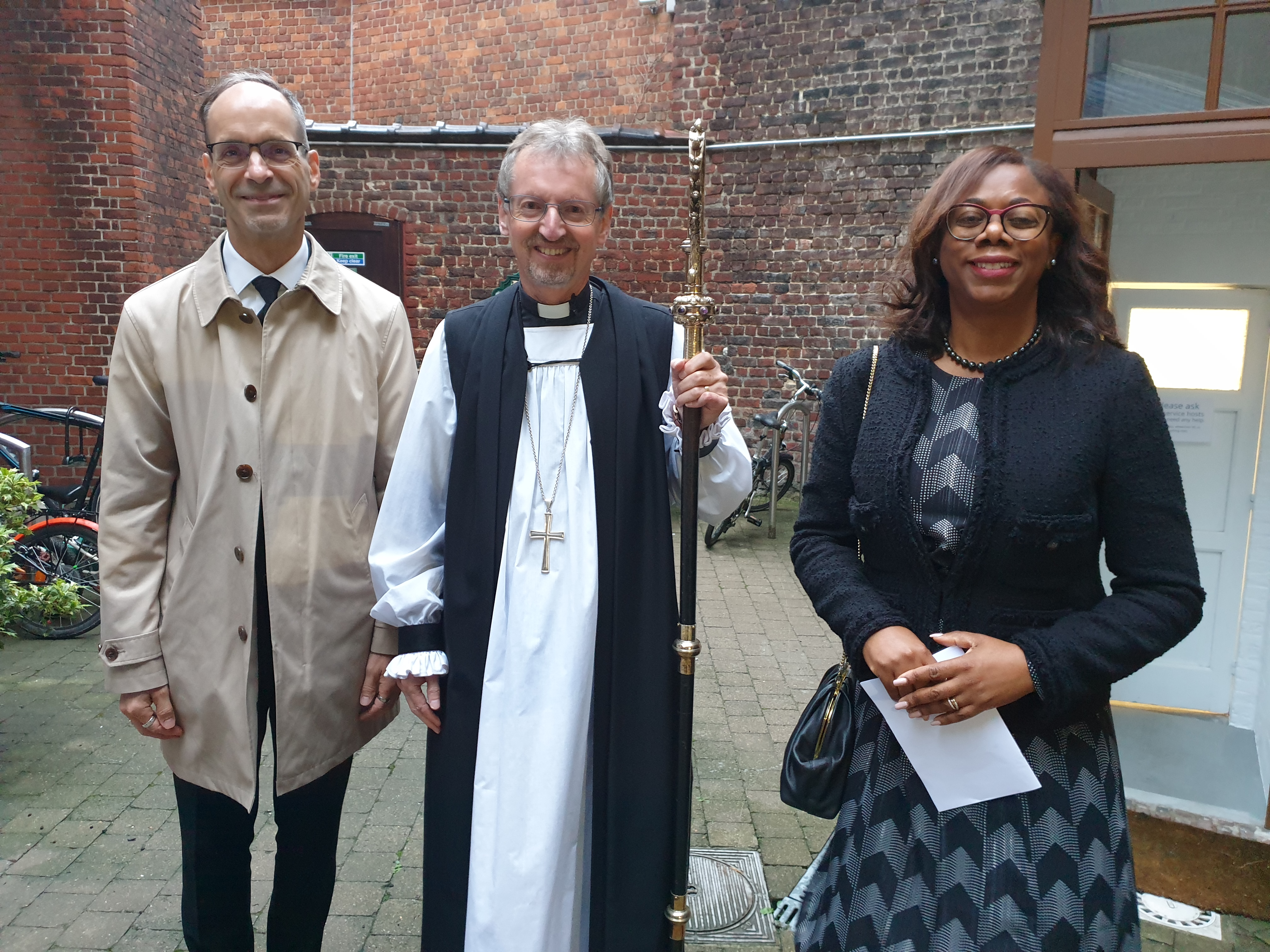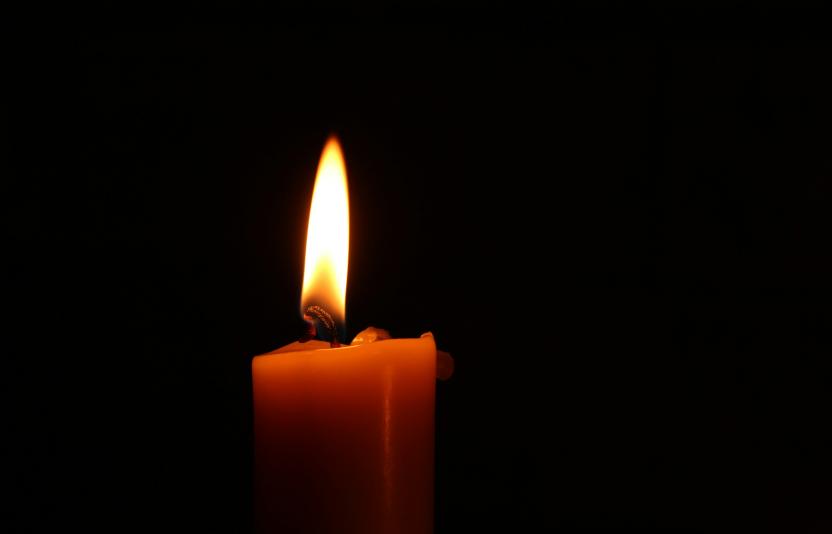Memorial Service for Her Late Majesty Queen Elizabeth II
On Saturday the eyes of the world were on London for the funeral of Queen Elizabeth II. In the evening Bishop Robert preached at a memorial service at the Pro-Cathedral of Holy Trinity Brussels. Here is his sermon in full:
It is my privilege as the Bishop of the Church of England Diocese in Europe to have the honour of addressing you this evening. The death of Her Majesty the Queen was an event which was not unexpected. Nevertheless, the news when it came was a shock. I felt sadness and grief: Elizabeth had been Queen for the whole of my life and longer, and now that stable presence had suddenly gone. In a dangerous and often frightening world she represented constancy and dependability. So yes, there was grief – but more significantly a sense of thanksgiving: thanksgiving to God for someone who had lived such a full and productive life, who had served her people so faithfully and well right up to the end, to the last week indeed of her 96th year.
I was fortunate to serve Her Late Majesty for a number of years as a Royal Chaplain. more significantly, as a new bishop I was invited to spend a weekend with her and other members of the royal family at Sandringham. The whole time was beautifully choreographed. I was struck by the way that changes of clothing marked out different activities and moods. At teatime on the Saturday, I was invited into the main salon where the Queen sat at a table playing patience. An equerry sat on one side and a lady in waiting on the other, and I was invited to sit opposite. As the Queen played patience, she threw out various comments and suggestions on a whole range of subjects topical, cultural, historical. And as her chaplain I was invited to comment or not. It was a marvellous way of conducting a conversation in a way that was both inviting and unthreatening.
On the Sunday morning, I was invited to preach. It was close to the start of the New Year, and I referred in my sermon to a poem which her father King George VI had read to the nation in 1939 on the outbreak of war:
“I said to the man who stood at the gate of the year
Give me a light that I may tread safely into the unknown
And he replied, “Go out into the darkness, and put your hand into the hand of God.
That shall be to you better than light, and safer than a known way.”
What I didn’t know, when I preached those words, what I only found out much later, was how significant they were to the Queen herself. For it was her, who at the age of just 13, had discovered this poem and had given it to her father to comfort and inspire him.
Actually, this poem expresses a simple and sincere trust in God which marked the late Queen’s entire life. In her famous 21st birthday radio address in 1947 she said:
“I declare before you all that my whole life whether it be long or short shall be devoted to your service and the service of our great imperial family to which we all belong. God help me to make good my vow, and God bless all of you are willing to share it.” Hers was a life lived according to a promise: the promise to trust God and serve her people.
This vow was confirmed and intensified at her coronation in 1953, a ceremony at the heart of which was not so much the public crowning but the private anointing with oil by the archbishop of Canterbury. The Royal Biographer William Shawcross wrote: “It was the
moment when the holy oil was applied to her that was of supreme importance for the Queen. Indeed, it was the most solemn and important moment of her entire life”. That sense of being set apart not to be served but to serve. Following the example of Christ, who was also anointed, as the word Christ means, and, in his case to sacrifice his life so we can have life that lasts for ever.
The Queen’s work included every day of the year except Christmas and Easter receiving and reading the red box of papers that arrive with her from various government departments, a weekly private meeting with the British Prime Minister, plus a heavy schedule of visits to develop goodwill and celebrate good work of all kinds: in business, manufacturing, senior citizens care homes, youth work, music, the arts. Displaying interest, empathy and encouragement to people in all stations and walks of life. Into her 90s she was still putting in a 40-hour working week. The Queen did not choose her work. She inherited it. But she chose to do her work in a consistently generous-hearted way and found joy in serving, in following the example of the Son of God who came to serve others and give his life that others might live.
The centredness of her life upon Jesus Christ was shown especially in her Christmas broadcasts to the nation and the commonwealth. These invariably referenced the birth and life of Jesus. It would have been easy to reduce the birth of the incarnate Son to a gift-giving festival. But she always did mention Jesus in her address. And always as the climax of the address.
These days, the idea of self-sacrifice is unfashionable and outdated. We prefer to talk about living our lives rather than giving our lives. But that is what makes a sacrificial life all the more impressive and attractive when you see it.
Perhaps particularly as she grew older, the theme of forgiveness and reconciliation became a more prominent and explicit part of her life and work. In 2011 she said:
“In 2011 she said: “Although we are capable of great acts of kindness, history teaches us that we sometimes need saving from ourselves – from our recklessness or our greed. God sent into the world a unique person, neither a philosopher nor a general, but a Saviour, with the power to forgive. Forgiveness lies at the heart of Christian faith. It can heal broken families, it can restore friendships, and it can reconcile divided communities.”
She worked hard for reconciliation, particularly reconciliation between Protestants and Catholics and between the United Kingdom and Ireland. I think of her historic attendance at a Catholic service at Westminster Cathedral in 1995, the first British monarch to attend Roman Catholic worship in 400 years. In 2011 she made a four-day visit to the Republic of Ireland, the first UK monarch to visit the independent state, during which she laid wreaths in a garden dedicated to those who had died fighting British rule. It was a visit described by the then Irish President Mary McAleese as ‘magical’. The following year she visited Northern Ireland, shaking hands with the former IRA leader Martin McGuiness. albeit that a beloved member of her own family, Lord Mountbatten, had been assassinated by that organisation. Forgiveness and reconciliation require courage and they are risky.
Our own diocese has reason to be grateful for Her Majesty’s willingness to take these kinds of reconciling risks. In 1994, she visited St Andrew’s Moscow, which had been confiscated by the Communists for use as a recording studio, and as a result the then President Yeltsin
signed an order to return the property to religious use. And please God, we use it as a major centre of Anglican worship today.
Her Majesty the Queen was truly an agent for peace and reconciliation on the global stage, and perhaps in Europe in particular. Her visit to Germany in 1965 was the culmination of a 20-year process of post-war reconciliation. In offering condolences, Chancellor Olaf Scholz has said: “Her commitment to German-British reconciliation after the horrors of World Word 2 will remain unforgotten.” And President Walter Steinmeier praised her 1965 visit as an “invaluably important signal of reconciliation after two devastating world wars”.
And I have been especially touched by the condolences expressed by President Macron of France: “We are grateful for her deep affection for France: Elizabeth II mastered our language, loved our culture and touched our hearts…from her coronation on, she knew and spoke with all our presidents. No other country had the privilege of welcoming her as many times as we did.” Her Majesty the Queen was truly an ambassador of reconciliation.
I must begin to draw to a close.
In 1952, as the then Archbishop of Canterbury, Geoffrey Fisher, helped the Queen prepare for her role, he told her that she was called by God “to exert a spiritual power and lead her subjects by her personal example.” Indeed, one of the most remarkable things about the Queen is her consistency of character. As the political commentator Andrew Marr has observed: “There are no reliable recorded incidents of the Queen losing her temper, using bad language, or refusing to carry out a duty expected of her.” She has shown herself to be enormously adaptable to changes in technology and culture, growing up before there TV, the internet or jet engines. She has known when to preserve the dignity of the role but also known when to engage more informally. A headline in the Roman Catholic journal ‘the Tablet’ once declared: “No Head of State in the world embodies the notion of incorruptible public decency better than Queen Elizabeth II.” So, this evening we celebrate a life marked by service, duty, constancy, integrity and decency.
Six months before her Coronation, Elizabeth asked the people of the UK and Commonwealth to “Pray that God may give me the wisdom and strength to carry out the solemn promises I shall be making, that I may faithfully serve Him and you, all the days of my life.” God it is clear, has answered those prayers.
Finally, when asked one evening after dinner whether she lay awake and worried about things, she is reported to have said: “I am not sure what you are talking about. I get up in the morning. I do the best I can all day. I go to bed in the evening, say my prayers, and go to sleep. What do you do?”
We owe to God, and to the Late Queen Elizabeth II enormous gratitude and thanksgiving. The life and work of a truly remarkable monarch has drawn to an end. May she now rest in peace.


Thank you to everyone who has sent us photographs and details about the various memorial services that have taken place around the diocese to mark the death of the Queen. We will publish a selection of those photographs on our website tomorrow.


